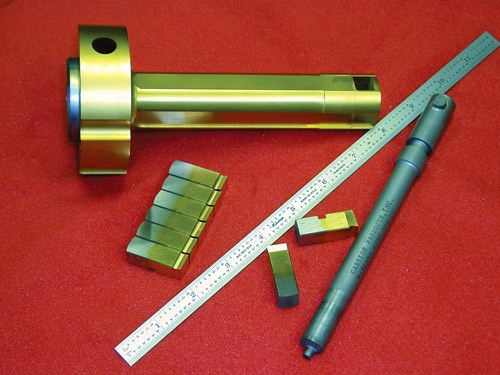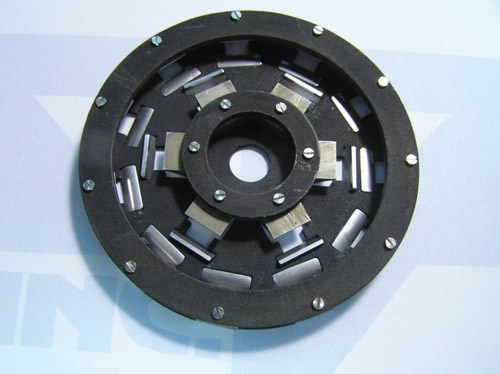Simplifying the machining process makes a shop more productive, and no shop knows this better than Carbide Products Inc. (Georgetown, Ky.). This job shop has reduced programming time and virtually eliminated programming errors by switching to Esprit software from
DP Technology.
In the past, the company was forced to use different software packages to obtain the full range of required capabilities for metalcutting and EDM.
“Being able to rely on a single software package for our complete machining requirements makes it easy for our people to move from one department to another as needed to balance the workload and saves on training and software licensing,” says Paul Williams, V.P. of engineering.
Established in 1943, Carbide Products Inc. (CPI) manufactures made-to-order high-precision parts, tools, dies and assemblies for customers around the world. The complex tools and parts manufactured at the company often require high skill in several machining disciplines to complete, including turning, milling, wire EDM, sinker EDM, surface and cylindrical grinding and other processes. The company relies heavily upon the ability of its CNC programming team to quickly produce programs for an array of machines that produce quality parts on the first production run.
Range of Machining Capabilities
The job shop machines a variety of materials and material combinations. All machining processes, including heat treating, brazing, assembly, inspection and documentation are performed in house for total quality control.
The majority of CPI’s production consists of special tooling that is used to make other products from machine tools and powertrain components to peanut butter, pencils and light bulbs. Production runs tend to be very short, often only a single piece. The result is that the company does much more CNC programming than most other companies of the same size. Also, tolerances tend to be extremely tight, often ± 0.0001 inch. The materials used by the company tend to be costly, so it’s essential to get the program right the first time.
In the past, the company used several different CNC programming systems for EDM, turning or milling. This made it difficult for programmers to help out in an area that was particularly busy and increased the complexity of training and administration.
CNC Programming Challenges
When Ron Wainscott, EDM department supervisor, first joined the company, it was much smaller, and he was able to handle all the programming by himself. However, as the company grew, the task became more than he could handle. Today, the EDM, lathe and mill departments each have their own programmers.
“Our ability to respond quickly to customer requests is critical to our success,” he says. “We might have a customer call whose production is down and needs a tool or machine part to get it restarted. We will immediately begin programming the part, and then go right into production and potentially have the part ready for the customer in a couple of hours.”
Esprit software first came to CPI’s attention when it had problems with its previous EDM software when programming a new Mitsubishi machine. Mitsubishi recommended it because many of its other customers were using it successfully. “We also heard good things about the software from other machine shops that were attending the International Machine Tool Show (IMTS),” Mr. Wainscott says. “We found that it is capable of generating accurate posts for the new machine and that it lends itself to fast turnaround work. The software also provides a number of other valuable features that were lacking on our previous programming software.”
Programming for Milling and Turning
Programming parts for milling and turning can be done with the same user interface and following the same basic workflow, which makes life easier for the programming team. Lee Ross, milling department supervisor, says the programming of a part in his department typically begins with defining the geometry with Esprit based on a paper drawing provided by the customer. He adds grind stock, and then defines the features in the part. CPI uses a combination of application-specific machining in which the machining operation is defined for the individual application and knowledge-based machining, which involves reusing operations that have been optimized for specific materials, geometries and tools.
The milling department has developed a library of machining operations that include the tool and associated machining parameters and can be simply dragged and dropped onto a feature to create a toolpath. The software’s KnowledgeBase provides detailed tool control and extensive process automation, automatically choosing the most suitable process to machine a given feature—including machining cycles, cutting tools, speeds and feeds, and all associated machining parameters. When a process is applied, process steps are automatically adjusted to accommodate the feature geometry and other feature characteristics. This saves time by automating many tedious programming functions. The KnowledgeBase also can help reduce machining cycle times by providing programmers with standardized operations that have been optimized by highly skilled and experienced programmers.
Regardless of the type of machine being programmed, the next step is simulating the entire manufacturing process in order to verify that the part produced by the program meets the customer’s requirements. The programmer can view each individual cut in the entire machining process in dynamic 3D solids. Esprit also makes it easy to inspect the finished part by comparing the as-machined workpiece with the original part design. Programmers can zoom in on the simulated part to determine whether or not it matches the customer’s design. The simulation performs a comparison of the toolpath with the solid model and displays any part violations as well as the amount of material remaining using a customizable color format. The simulation takes only a few seconds to run, but provides a highly effective way to identify and fix programming problems before they reach the shop floor.
“We use the software in almost every aspect of every process in our manufacturing operations,” Mr. Williams says. “Its advanced capabilities have helped us reduce programming time and increase machining productivity. We can now program the most complicated parts in considerably less time than was required in the past. Esprit’s knowledge base of machining capabilities enable us to optimize machining operations for cycle time improvements, store them in a library and quickly apply them to features. The ability to create a realistic simulation of the complete machining operation has helped us virtually eliminate programming errors, which reduces machine setup time and improves shop efficiency.”














.jpg;maxWidth=300;quality=90)








